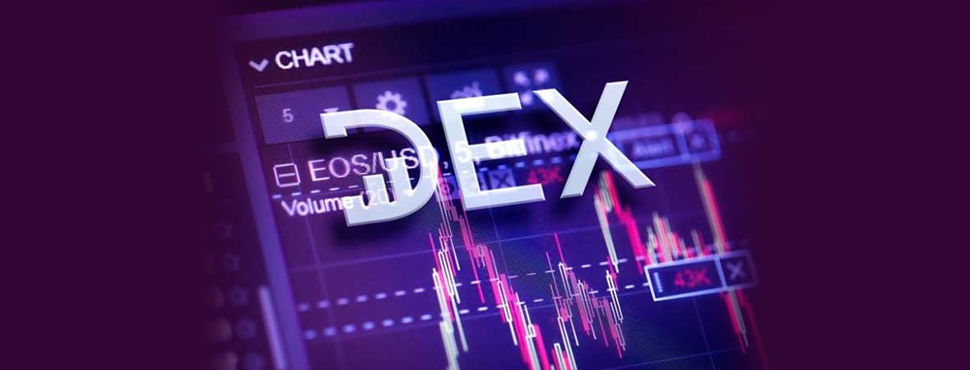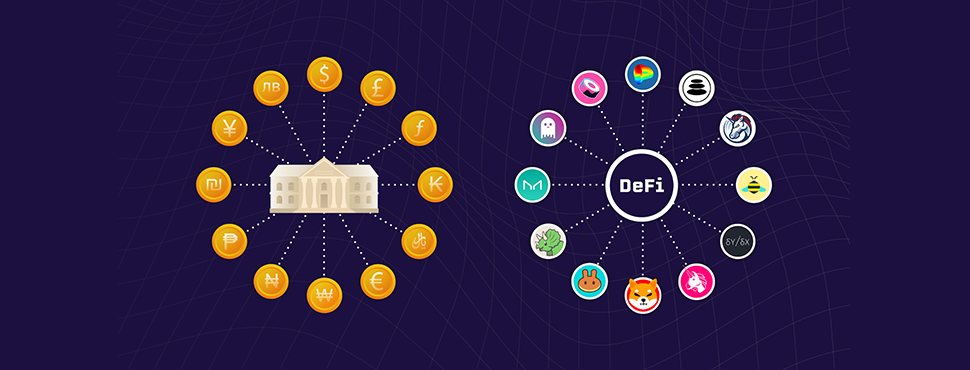share
Мир криптовалют в основном функционирует на ЦБ (централизованных биржах), которые управляют счетами и средствами своих пользователей, выступая посредниками. Многие люди не готовы предоставлять свою личную информацию и полагаться на системы безопасности бирж. Именно в такие моменты в игру вступает децентрализованная биржа (DEX). Давайте немного поглубже понимать, что это такое и как она работает.
Что такое децентрализованная биржа?
По определению, децентрализованная биржа или DEX — это онлайн-платформа, которая связывает продавцов и покупателей криптовалют и обеспечивает торговлю криптовалютами в формате одноранговой сделки (P2P). В отличие от централизованных бирж, DEX не являются кастодиальными. Другими словами, они не контролируют приватные ключи пользователя.
Таким образом, децентрализованные биржи не принадлежат и не контролируются ни одной компанией, но управляются большинством согласования участников сети.
DEX — это важный шаг к реализации децентрализации на основе блокчейна. В то время как ЦБ соединяют соответствующие заказы, децентрализованные криптовалютные биржи соединяют трейдеров, которые выдают эти заказы. Пользователи DEX автономны в отношении хранения и операций с их криптовалютными активами.

Сделки на децентрализованных биржах осуществляются с помощью самовыполняющихся соглашений, написанных в смарт-контрактах. По сравнению с традиционными финансовыми транзакциями, которые являются непрозрачными и проходят через посредников, предоставляющих очень ограниченную информацию о своих действиях.
С другой стороны, децентрализованные биржи обеспечивают полную прозрачность в движении средств и механизмах обмена. Точно так же, поскольку отсутствует участие третьей стороны, DEX уменьшают контрагентный риск и могут снизить систематический риск централизации в криптовалютной экосистеме.
DeFi: Основа децентрализованных бирж

Прежде чем понять, как работает децентрализованная биржа, важно понять идею децентрализованной финансовой системы.
DeFi — это тип финансовых технологий, который позволяет осуществлять транзакции с помощью смарт-контрактов, тем самым уменьшая необходимость в посреднике или централизованной институции, такой как традиционный банк или платежная платформа.
Таким образом, пользователи могут получить доступ к более дешевым, быстрым и эффективным финансовым инструментам.
Децентрализованная финансовая система обещает нарушить традиционную финансовую систему с аргументом о том, что централизованные системы обладают несправедливым монопольным положением перед пользователями, лишая их контроля над их финансовыми активами.
Децентрализованные биржи изначально были задуманы для устранения необходимости в каком-либо органе, контролирующем и одобряющем сделки, совершаемые в рамках определенной биржи. С помощью смарт-контрактов децентрализованные биржи управляют автоматизированными ордер-буками (или автоматизированными рыночными создателями) и сделками. Это делает их «подлинно одноранговыми».
Как работает децентрализованная биржа?
Как и подразумевает его название, децентрализованные биржи — это криптобиржи без центрального органа. Здесь нет центрального сервера, который можно было бы выключить или взломать, и нет единой сущности, которая могла бы контролировать биржу. Эта децентрализация имеет множество преимуществ, но одним из самых важных является безопасность.
Самая определяющая характеристика децентрализованных криптобирж заключается в том, что в сделках, инициированных на таких платформах, не участвуют третьи стороны. Вместо этого сделки заключаются непосредственно между пользователями через автоматизированный процесс.
Этот метод обмена называется одноранговым, или P2P. Большинство DEX фактически представляют собой dApp (децентрализованные приложения) или DAO (децентрализованные автономные организации), работающие на Ethereum или любой другой криптовалютной сети с функциональностью смарт-контрактов.

Итак, DEX работает по следующей логике:
- Владелец токена размещает ордер: для обмена своими активами/средствами на другие, доступные на DEX. Пользователь также указывает количество единиц, которые он хочет продать, стоимость каждого токена, а также указывает продолжительность времени, в течение которой разрешены ставки на его активы.
- Как только установлен ордер на продажу, как указано выше, другие пользователи могут подать заявки через ордер на покупку.
- По истечении времени, назначенного продавцом, все заявки рассматриваются и рассчитываются в наилучших интересах обеих сторон: покупателя и продавца.
Типы децентрализованных бирж
Всё больше и больше инвесторов находят децентрализованные биржи более надежными, чем их централизованные аналоги. Их время работы крайне высоко, поскольку узлы готовы предоставлять свои услуги в любой момент. В результате они могут гарантировать, что расчет сделок и сопоставление ордеров будут продолжаться. Пользователи могут запускать собственные узлы и перемещать свои активы в кошельки. DEX существуют в трех основных типах: автоматизированные рыночные создатели, оффчейновые ордер-буки и ончейновые ордер-буки. Все эти типы позволяют участникам торговать между собой непосредственно, используя смарт-контракты.
- Автоматизированные рыночные создатели (AMM): Автоматизированные рыночные создатели — это децентрализованные биржи, которые не используют ордер-бук для записи транзакций. Вместо этого они полагаются на автономные смарт-контракты и пулы ликвидности для предоставления пользователям децентрализованного опыта торговли. Они также используют оракулы, такие как Chainlink, для предоставления информации о текущих ценах криптовалют.
- Оффчейновый ордер-бук: Хотя оффчейновый ордер-бук использует схожий метод верификации с ончейновым ордер-буком, он полагается на внешние централизованные серверы для записи сделок. Преимущество этой модели заключается в том, что оффчейновые ордер-буки обычно предлагают более низкие комиссии, чем ончейновые ордер-буки DEX. Однако у оффчейнового ордер-бука нет такой же децентрализации, как у конкурирующих DEX.
- Ончейновый ордер-бук: Ончейновый ордер-бук использует крипто-майнеров и систему узлов для проверки транзакций и хранения информации на блокчейне. Ончейновый ордер-бук аналогичен ордер-буку централизованных криптобирж, за исключением того, что он не полагается на компанию для подтверждения транзакций. Поскольку такой ордер-бук общедоступен на блокчейне, его считают более прозрачным, чем оффчейновый ордер-бук.
Основные различия между DEX и CEX:
В отличие от централизованных бирж, таких как Binance или Coinbase, где владение монетами на 100% принадлежит бирже, у DEX нет владения ни одной из монет. DEX действуют только как связующее звено между двумя различными сущностями, которые хотят торговать своими криптовалютами, не удерживая ни одной из криптовалют, которые будут обменены. CEX обычно подвержены риску взлома и кражи криптовалюты, потому что известно, что они удерживают большие суммы криптовалюты.
В то же время, поскольку централизованные биржи предлагают услугу третьей стороны в криптовалютной транзакции, они обычно взимают небольшую комиссию за каждую сделку, совершенную на их платформе, помимо газовых сборов. DEX, с другой стороны, имеют только газовые сборы за каждую транзакцию.
Анонимность также является ключевым различием между DEX и централизованными биржами. На децентрализованной бирже пользователи могут оставаться анонимными и иметь доступ к большему количеству криптовалют, при этом наслаждаясь большей безопасностью, чем на традиционных биржах.

Централизованные биржи требуют, чтобы их пользователи заполнили анкеты KYC (знай своего клиента) перед началом торговли на их платформах, в то время как DEX требуют только наличия кошелька для начала торговли — не требуется верификация личности.
KYC требуется централизованными биржами из-за регулятивных проблем в зависимости от той страны, в которой они действуют. Некоторые люди не могут торговать или имеют ограниченные услуги торговли (например, ограничения по маржинальной торговле) на централизованных биржах.
Как использовать децентрализованные биржи
После выбора типа DEX, который лучше всего подходит для вас, вашим следующим шагом будет понимание, как их использовать. DEX все еще находятся на начальном этапе развития, и многие из них поддерживают только базовые функции торговли.
По мере их развития можно ожидать появления большего количества функций и улучшений. Тем не менее, есть несколько ключевых моментов, которые следует знать о использовании DEX.
Важно помнить, что децентрализованные биржи все еще являются относительно новой технологией. В результате они могут быть не такими удобными для пользователей или иметь такой же уровень поддержки клиентов, как и их централизованные аналоги.
Вот краткое руководство по использованию децентрализованных бирж:
- Выберите вашу децентрализованную биржу. Некоторые популярные варианты включают Uniswap, Curve, PancakeSwap и Binance DEX.
- Подключите свой кошелек. Вам потребуется подключить криптовалютный кошелек для торговли на децентрализованной бирже. Некоторые популярные кошельки включают MetaMask, Trust Wallet и Coinbase Wallet.
- Затем вы можете добавить совместимый с DEX нативный токен, например BEP-20 для Binance DEX, и выбрать различные опции торговли или добычи доходов (yield farming).
Правовой статус децентрализованных бирж (DEX)
Быстрый рост децентрализованных бирж оказался вызовом для регуляторов рынка и породил новые правовые вопросы. Статус DEX является неоднозначным, потому что некоторые из их функций, такие как анонимность, противоречат некоторым требованиям действующего законодательства.
Различные страны пытаются решить эту проблему по-разному. США прилагают усилия для применения существующей правовой базы, в то время как власти Сингапура стремятся создать новую регуляторную систему для таких бирж. Тем не менее, в этих странах нет однозначной позиции по отношению к DEX, в то время как некоторые другие вообще не регулируют такие платформы.
Одной из основных трудностей, связанных с регулированием децентрализованных бирж, является то, что в большинстве случаев они не контролируются определенным юридическим лицом или человеком. Это приводит к проблемам с определением ответственного лица при обнаружении нарушений. Могут возникнуть значительные трудности с регулированием торговых деятельностей. Именно поэтому невозможно применить к ним меры и правила, применимые к централизованным биржам.
Что дальше для децентрализованных бирж?
Сатоши Накамото задумал Bitcoin частично с целью освободить людей по всему миру от традиционных финансовых ограничений. Для Накамото децентрализация была ключевым компонентом этики криптовалюты.
Хотя децентрализованные биржи предлагают множество значимых преимуществ по сравнению с централизованными биржами, широкое распространение DEX вряд ли произойдет, пока DEX не станут лучше понятыми и более простыми в использовании.
Относительно низкие объемы торгов на DEX также делают рынки, которые они поддерживают, менее ликвидными, чем централизованные рынки для тех же токенов.
С течением времени технологические прогрессивные изменения скорее всего значительно увеличат использование DEX. Скорее всего, это только вопрос времени, когда использование децентрализованной биржи станет более распространенным способом покупки или продажи криптовалюты.






